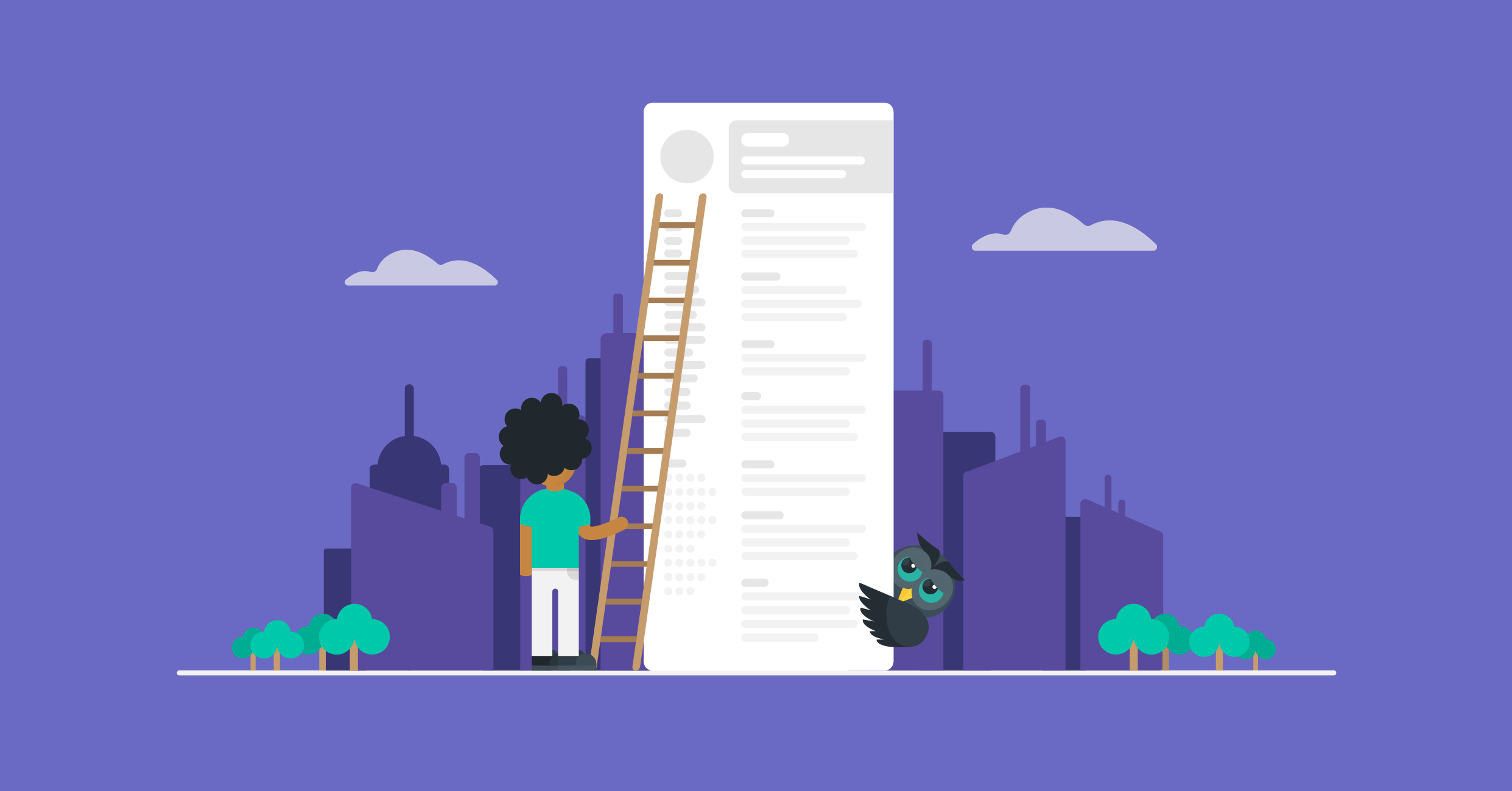How Long Should a Resume Be in 2026 [For Any Profession]
Updated on 02/24/2026

You’ve probably heard time and time again that a resume should be strictly one page.
What if you have a TON of experience, though? What if you just can’t fit all the cool stuff you’ve done on a single page?
With that comes the dilemma:
How long should a resume be?
Can you exceed the strict one-pager?
A simple Google search will reveal conflicting opinions.
Some career experts emphasize time and time again to stick to the golden one-page rule. Others suggest this practice is preferred, but not mandatory.
So, which one is it?
Here’s the thing - there’s no magic one-size-fits-all rule on how long should your resume be. It really depends on several factors.
Luckily, we’re here to help set the record straight.
In this guide, we’re going to walk you through:
- How long should your resume be?
- What’s the ideal length for your resume depending on your experience level
- How to fit your resume on one page
- How long should a CV be
How Long Should a Resume Be

Short answer: it depends, but in most cases, you should stick to the one-pager.
The long answer?
Well, here’s the thing. There’s a very good chance that you don't actually need to get past one page.
Unless you have 20+ years of experience, a single page should be more than enough. Your resume should be a summary of your most relevant, most recent work experience.
It’s not supposed to be a detailed account of everything you’ve ever done in your life.
For a mid-level professional, here’s what you’d add to your resume (which would result in 1-page MAX):
- Contact information section
- 2-3 work experience entries
- 1 or 2 education entries
- Skills section
- Languages section
Now, if we turn this into a real-life resume, you’ll see that it’s going to be hard to go past one page.

If you do have a decade’s worth of work experience, though, or if you’re a senior executive, you can actually break this rule and go for 2.
Make sure to ask yourself, though, “am I aiming for quality over quantity? Are all the work experience entries I’ve mentioned relevant?”
Now, you might be thinking, “do I ever go beyond 2 pages?”
Well, you can potentially go for 3, but that’s only if you’re…
- A senior-ranking executive with a remarkable track record.
- Applying for a federal job that requests more information contrary to a civilian application.
- Have a long, lengthy background and you need to hand over case studies, testimonials, project highlights.
💡
Quick Tip
Never write above three, though. If Elon Musk's experience can fit on one page, so can yours.
How far back should a resume go?
Your resume shouldn’t go back further than a maximum of 10 to 15 years.
You want to keep the information on your resume relevant to the job you are applying for.
The HR Department is most likely not interested in what you were doing 20 years ago. Even if it’s very impressive, chances are, you've done much more significant things in your past 3 positions than whatever you did 18 years ago.
Pro-tip
- Not going back very far also sidesteps age discrimination. If your resume dates back more than 15 years, the HR department might guess your age. And if it’s a young applicant they’re looking for, your resume can be rejected right away.
Are there times you need to absolutely include more than 10-15 years' worth of work experience in your resume?
Yes, occasionally.
More specifically, you would want to include dated experiences if:
- You are applying for a job in a field you used to work for more than 15 years ago and you don’t have the recent professional experience to account for. In that case, old relevant experience is better than no experience.
- Your dated experience is actually of extremely high importance. Maybe you used to be president of the United States or CEO of Coca-Cola. You can choose to use that to your advantage since it speaks to your qualifications and prestige, even if it’s old news.
How long should a student resume be?
If you’re a student, you should never, ever, go past the one-page limit. You barely have any work experience, so whatever information you’re adding that goes past one-page, it’s probably not that relevant.
If you’re having difficulty fitting everything into one page, look at every point in your resume critically.
Do you really need to let your prospective employer know about every single one of your volunteering experiences and extracurriculars, or make your summer lifeguard job occupy one-third of your resume?
The answer is no, not really.
Instead, focus on your most impressive qualifications, best academic achievements, and fields of study relevant to the job you are applying for, and you’ll find out you probably don’t even need a full page.
Want to learn more about how to write the perfect student resume? Check out our complete guide with samples & tips!
Resume Length for Your Experience Level
Still uncertain about how long your resume should be? Check out our cheatsheet to find out.
The table below displays the recommended length of your resume, based on your years of experience.

How to Fit a Resume on One Single Page
Let’s get real.
An entry-level applicant can insert all relevant information under one page because he/she doesn’t have much relevant experience. The alternative is appearing like they’re not making a serious enough effort to write a concise application.
For folks with more experience, however, this can be a bit trickier.
Here are some tips on how to turn your resume into a concise one-pager:
- Use an online resume builder. Pick a free template resume that is optimized for length and let it do all of the work for you. You don’t need to mess around with the font and formatting: the resume builder will fit everything in one page for you.
- Focus on relevant information. Yes, this again. It’s crucial you carefully go through the job description and the main skills your employers are searching for. If you are applying for a job as a software engineer, don’t mention your internship as a social media manager. Cut your “yoga” from your list of interests. If the employer is not looking for it, you don’t need to have it in your resume.
- Achievements over responsibilities. Don’t list everything you were responsible for. That will not only prolong your resume and bore the employer, but won’t make you stand out. Your prospective employer knows what your main responsibilities were if you list “Sales manager” on your resume. They are the same as 50 other applicants that applied with the same work experience. Focus on tangible performance indicators instead. Instead of saying “did sales at X,” go for “Hit and exceeded department KPIs by 20-30% for 5 months in a row.”
- Customize spacing. You can always make room for more entries if you reduce the document margins space. You can, for example, customize the margins to 0.5” instead of the regular 2.5”. You can also mess around with the space between bullet points and sections.
- Smaller fonts. A 12pt font might have been the norm for university papers, but that doesn’t mean you have to follow it for your resume. Try out an 11 or 11.5 font to win some more room. Make sure everything is readable without zooming in, though!
- Bullet points. Instead of listing job or education descriptions as paragraphs, use bullet points instead. Keep your sentences short and to the point.
- Remove unnecessary headers. Contact information or the resume summary will do just fine without their own personalized headers.
- Don’t include your high school. Unless you used to study in a very specialized high school, or your employer went to the same high school as you, exclude it. It’s hardly ever relevant to the job you’re applying for.
- Exclude repeated bullets. If you undertook similar responsibilities in more than one company, don’t repeat the same job description. No need for the hiring manager to read how you “analyzed industry trends” three different times.
- Cut your resume summary short. Keep in mind that a resume summary is supposed to wrap up your most impressive qualities for the job. It doesn’t need a 6 line introduction and 10 bullet points. Cut it down to three text lines. For a better understanding of how to properly write your resume summary, check out this guide.

How Long Should a CV Be?
We’re going to say it before you ask:
Yes, in the USA, a CV is different from a resume.
A resume is customized to each individual job you are applying to and is strictly one page.
A CV, on the other hand, covers the in-depths of your career and academic journey. It is usually used in Academia.
Because the goal and nature of a CV are different than that of a resume, you shouldn’t necessarily strive for the shortest pitch possible.
Most recruiters agree that the average golden length for a CV is two or three pages.
However, depending on your years of experience, accomplishments, training, and education, it can go up to eight pages.
Not sure if you need a CV or a resume? Check out our guide that explains the difference between the two.
Key Takeaways
Now, let’s go through everything we’ve learned:
- For most candidates, a resume should be only one page. Be brief and concise with anything you write on your resume. Customize your resume for the job you’re applying for and include only relevant experience. If you’ve done everything right, you shouldn’t get past one page.
- If you have 10-15+ years of experience, it’s okay to write a 2-page resume as long as all the information presented is relevant to the job.
- You can play around with the spacing, margins, and format of the resume to make all your information fit on one page. If you want the easy way out, use a resume builder.
- For Americans, a CV is different from a resume. It is primarily used in Academia and serves as an academic and experience diary. Since it’s not a short pitch, the length of a CV is usually 2-3 pages but can go up to 8 pages depending on your background.
Suggested reading:



